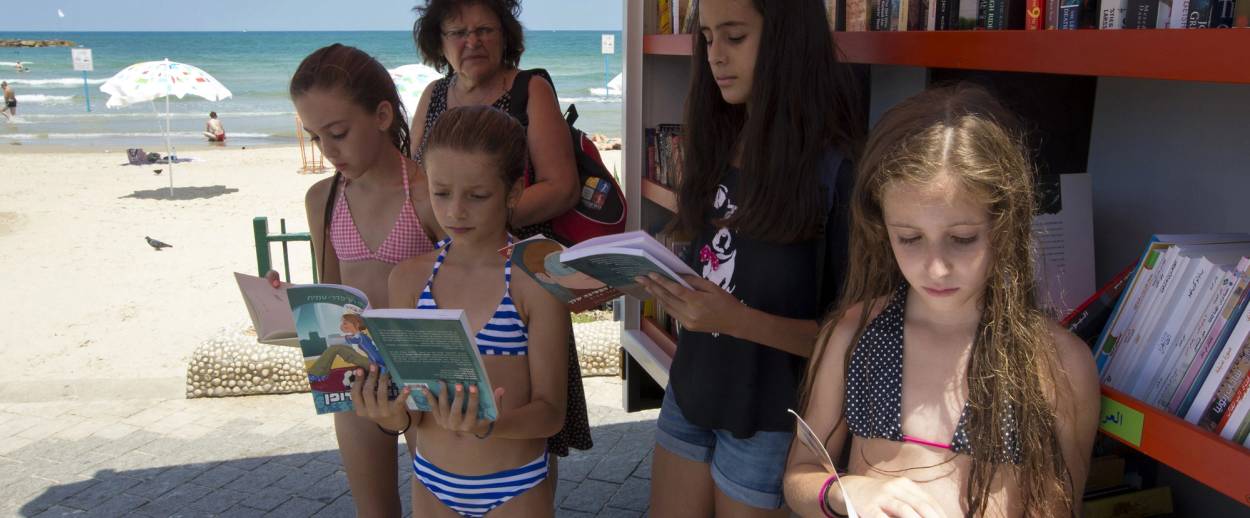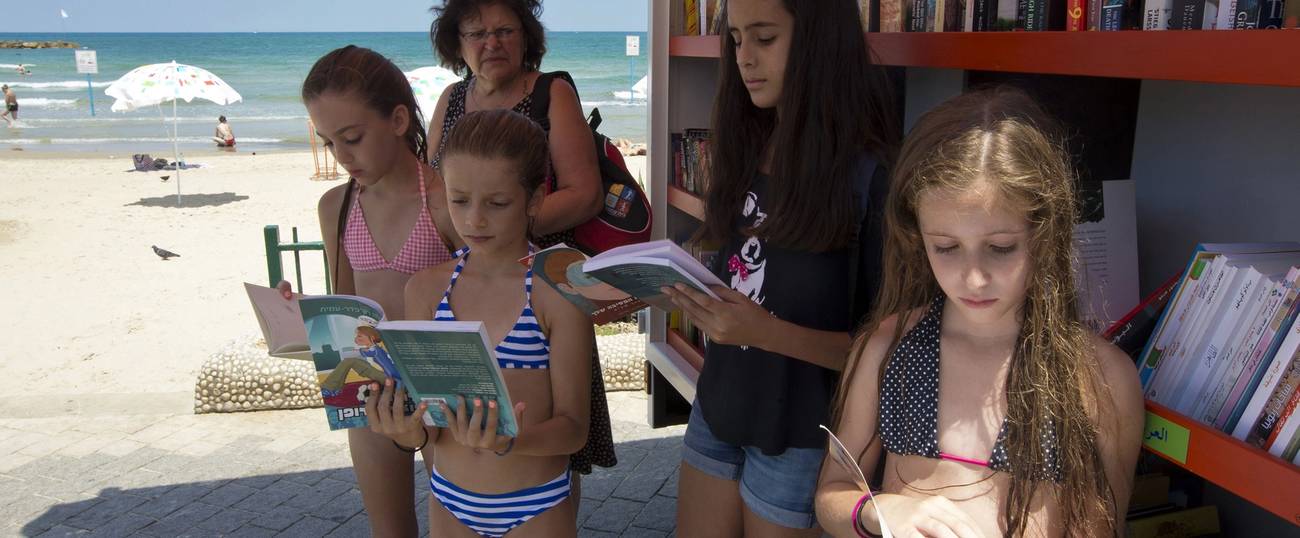Israel’s Real Thought Police
Forget that so-called banned book; the real problem with Israeli education goes much deeper




Many are the tender moments that shape a young person’s life: that first sweet kiss, that first bitter heartbreak, one’s first time in a small, airless classroom answering silly questions about Sophocles’ Antigone, wishing ill on just about everyone in Thebes.
Even though it’s been more than two decades, it’s the last of these milestones that I remember most clearly. I can’t for the life of me recall the name of the girl with whom I first locked lips, but trying to opine on Creon’s relationship with his rebellious daughter in the midst of a merciless Israeli summer is a torment I won’t soon forget. This, perhaps, is why Israelis call their high school matriculation exams the Bagrut, the Hebrew word for maturity; put up with long, compulsory stretches of literary analysis in 103 degree weather, and you, friend, may call yourself an adult.
There was nothing particularly grown-up, however, about last week’s kerfuffle over the Israeli education ministry’s decision not to include a novel, Dorit Rabinyan’s Borderlife, in the high school curriculum. The novel focuses on the love story of Liat, a young Israeli translator, and Hilmi, a Palestinian painter, an interfaith romance that struck the ministry’s bureaucrats as problematic. And while the intricate machinations of government work rarely make headlines, the Borderlife decision was soon front-page news, portrayed by liberalism’s ink-stained bullies as the only-slightly-milder sibling of a book-burning and yet another sign that Israel was slouching towards fascism, the whimpering of truth and reason everywhere drowned by the jack-booted march of the nationalist hordes. “Israel,” ran one typical headline, this one in Haaretz, “Bans Novel on Arab-Jewish Romance from School.”
Because I aced my Bagrut in literature, and was taught very well at HaRishonim High School how to closely read text, I was a bit puzzled as to why a decision by professional educators not to include a book in a list of mandatory novels amounted to anything akin to a ban. And because it hasn’t been that long since I graduated high school—or at least that’s what I like to tell myself while shaving away those gray patches in my beard—I remember the list of mandatory novels quite well: It already includes Sami Michael’s A Trumpet in the Wadi, the moving tale of Huda and Alex—she a young Arab woman, he a musically inclined Jew, both beautiful and doomed in Haifa in the 1980s; Amos Oz’s My Michael with its Jewish heroine, Hannah, overcome with erotic fantasies about her friends, the Arab twins Halil and Aziz; and I.B. Singer’s The Slave, in which an indentured Yid falls in love with his master’s shiksa daughter Wanda. For a ministry allegedly run by a bunch of right-wing guardians of racial purity, that’s quite a list.
Why, then, all the uproar? Because what’s truly under investigation here—this, after all, is a Jewish state, where everything worth talking about is also worth interpreting, complicating, annotating—is not Rabinyan’s book but Israel’s values. In declining to canonize Rabinyan’s book, the ministry of education made a call to favor works that explore not the nation’s failings—aside from the interfaith love story, Borderlife is rich with description of IDF soldiers behaving cruelly toward bedraggled Palestinian innocents—but its glories. And that, to some in Israel, is hard to take.
To those guardians of good taste and right thinking—comprising, if you’re stereotypically inclined, authors and academics and op-ed writers and entertainers and the other usual suspects one finds everywhere among the tender and progressive elites—a book is only worth its salt if it, to borrow a few bon mots, problematizes power relations and undermines the hegemony of the privileged classes. That’s good ideology, which explains why so many Israeli novels—many of which have pride of place on the ministry of education’s list—are shivering, introspective mea culpas about all sorts of wrongdoings, real and perceived. But try to argue that the Jewish state should teach, say, Jewish values, and you’re likely to be labeled a benighted brute.
Amiram Goldblum and Ofer Cassif are cases in point. The two, professors at the Hebrew University in Jerusalem, took to social media last month and called Israel’s minister of justice, Ayelet Shaked, “filth” and “neo-Nazi scum.” This barely made the news, which is just as well: Unless they advocate violence, like the odious Steven Salaita, academics in a free society should be free to rant on Facebook without making the news or having to defend their opinions. But imagine for a moment that instead of offending Shaked with the worst epithet imaginable the professors in question had marched into class wearing t-shirts emblazoned with the smiling face of Meir Kahane, the slain rabbi and politician who is the patron saint of the hard-core Israeli right. If the Rabinyan case is any yardstick, such a move would generate at least 31 headlines in Haaretz, all of which declaring the death of Israeli democracy.
Don’t believe me? Ask Yisrael Aumann, the Israeli Nobel Laureate who was refused an honorary doctorate from Haifa University because his views were found to be too unsettlingly right-wing.
This is what real ideological bias looks like. Young Israelis who want to read Rabinyan’s book can still do so—the author has enjoyed a spike in sales following the controversy, and 10 prominent high schools held impromptu readings. But anyone dedicated to more traditional stuff would likely have a hard time finding much love in a college classroom—where professors can openly advocate a campaign of intimidation against conservative students—a publishing house, or an editorial page anywhere in Israel. Having long ago allowed their lively and curious liberalism to harden into progressive dogma, the defenders of the left-wing faith are mostly interested in blocking out opposing views, even if their opponents are skilled technocrats making legitimate judgments in a narrow, professional context.
And that’s a shame. To remain robust, a democracy, any democracy, needs dissidents and iconoclasts and pains in everyone’s side, not commissars zealously toeing the party line. Which books Israeli kids end up reading is hardly the issue; whether or not they ever learn to think freely and critically is.
***
Like this article? Sign up for our Daily Digest to get Tablet Magazine’s new content in your inbox each morning.
Liel Leibovitz is editor-at-large for Tablet Magazine and a host of its weekly culture podcast Unorthodox and daily Talmud podcast Take One. He is the editor of Zionism: The Tablet Guide.